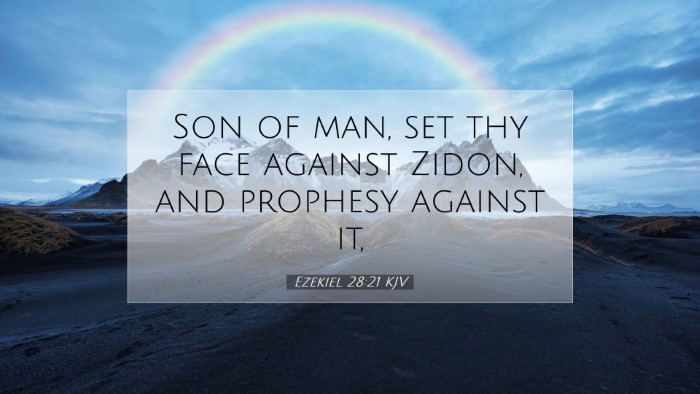Bible Commentary on Ezekiel 28:21
Verse: "Son of man, set thy face against Sidon, and prophesy against it," (Ezekiel 28:21, KJV)
Ezekiel 28:21 is a significant verse in the larger context of prophetic judgment. The focus here is on Sidon, a prominent city and harbor in ancient Phoenicia, known for its trade and idolatry. This verse serves as a turning point in Ezekiel's prophecies, highlighting the theme of divine judgment against not just Israel, but neighboring nations as well.
Contextual Significance
This chapter can be seen as part of a broader prophetic message against various nations, wherein God uses Ezekiel as His mouthpiece. Sidon, being a city of pride and commerce, represents the arrogance of those who defy the sovereignty of God. The call to "set thy face against Sidon" emphasizes Ezekiel's role as a prophet who must confront these nations with their sins.
Theme of Judgment
- Divine Displeasure: The judgment upon Sidon highlights God's displeasure with the practices of idolatry and immorality prevalent in the city. Commentators, such as Albert Barnes, suggest that this reflects God's unyielding stance against sin wherever it occurs.
- The Role of the Prophet: Matthew Henry observes that prophets are often compelled to prophesy against cities and nations to reveal God's attitudes toward their unrighteous behaviors. The directive given to Ezekiel is a clear indication of the prophetic duty in the face of sin.
- Retribution and Restoration: Adam Clarke mentions that while the judgment upon Sidon appears harsh, it serves a purpose - to restore right order and glorify God in the lives of His people. God's judgments are never arbitrary; they are corrective and redemptive, aiming for restoration.
Historical and Cultural Context
Understanding the context of Sidon during the time of Ezekiel is crucial for grasping the fullness of this prophecy. Sidon was characterized by:
- Economic Power: As a center for trade, Sidon exemplified wealth and prosperity often associated with moral decay. Its prosperity led to pride, which is often a precursor to divine judgment.
- Idolatry: The practice of idolatry in Sidon, particularly the worship of Baal and Asherah, exemplifies rebellion against God. Henry articulates that this verse encapsulates the inevitable consequences for nations that turn away from true worship.
- Geopolitical Dynamics: The text reflects not just spiritual dynamics but also the geopolitical tensions of the time, where nations like Israel looked on the flourishing Sidonian city, often leading to envy and disdain. Clarke notes that God's judgments serve to realign these imbalances.
Theological Implications
The broader theological implications of Ezekiel 28:21 include:
- The Holiness of God: The call to prophesy against Sidon underlines God's holiness and righteousness. This emphasizes that God does not overlook sin, regardless of a nation's cultural achievements.
- Prophetic Responsibility: Reflecting on this verse reminds theologians of the weight and responsibility that comes with prophetic office. Their role is to communicate God’s message, even when it is one of judgment, demonstrating God's concern for all peoples.
- Hope Amidst Judgment: Clarke also points out that within the severe pronouncements of judgment, there lies an invitation to repentance. The prophetic voice often bears the potential for hope and a path towards restoration through turning back to God.
Application for Today
For pastors, students, and theologians, the message of Ezekiel 28:21 calls for reflection on the modern-day implications of pride, idolatry, and the prophetic voice. Key applications include:
- Confronting Idolatry: Recognizing contemporary idols - whether materialism, self-glorification, or societal pressures - is essential. The call toward prophetic confrontation against these modern idols mirrors Ezekiel’s mission.
- Emphasizing Divine Authority: The authority of God and His word must be upheld in teaching and preaching. Sidon’s example serves as a stark reminder of the results of disregarding divine authority.
- Encouraging Repentance: Pastoral leaders today are reminded through this message to emphasize the possibility of redemption and grace amid judgment and challenge congregations to return to God wholeheartedly.
Conclusion
Ezekiel 28:21 encapsulates critical truths concerning divine judgment, the importance of prophetic duty, the nature of idolatry, and the hope of restoration. As we consider the lessons from Sidon's fate, it becomes clear that this message is not only pertinent for Israel and its neighbors but also rings with relevance for today’s world, encouraging both admonition and an invitation to return to the true God.


